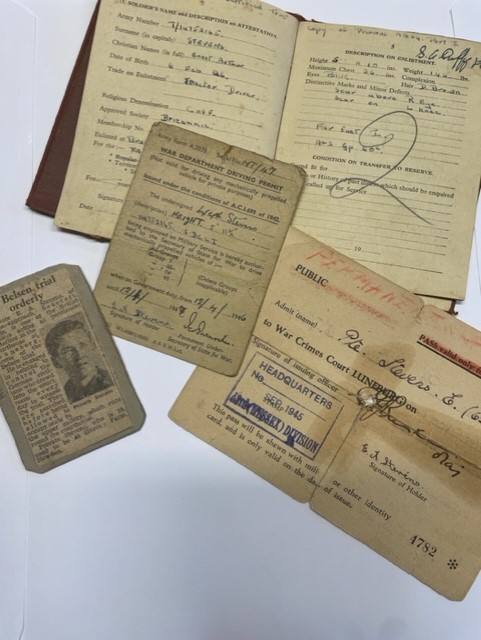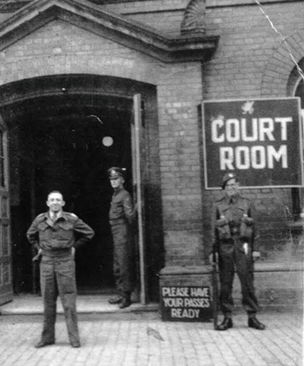Holocaust Memorial Day is a time for remembering the millions of people who lost their lives during the Holocaust and subsequent genocides across the world. The theme for Holocaust Memorial Day this year is ‘ordinary people’, which calls for us to reflect on the ordinary people who were persecuted, who became perpetrators and who risked their lives as rescuers and liberators, under the Nazi regime.
Ordinary People
Contemplating this theme and relating it to our own archives, we are drawn to the role of the DCLI soldiers of the 5th Battalion at the Belsen Trials. Among these soldiers was Private Ernest A Stevens of Grove Farm, Howden. Having signed up to the territorial Army just two months after his 18th birthday, he was only 19 years old when he was stationed at Luneburg, serving as a British orderly for the first Belsen Trial.
Embodying the idea of the ‘ordinary person’, Private Stevens’ trade at enlistment is documented as a Tractor driver; a world far removed from the charge of some of the most prominent Nazi war criminals, in which he found himself, less than a year later.

Liberation of Belsen
The liberation of the Bergen-Belsen concentration camp by British forces in April 1945, emphasised to the world the stark horrors of the Nazi war crimes. Devastatingly, on entering the camp, British troops discovered the bodies of thousands of prisoners. Living among the deceased, was an estimated 60,000 gravely ill prisoners, most of them starved, and ridden with diseases such as typhus and dysentery. In the weeks that followed, almost 14,00 more people perished as a result of the barbaric conditions they had been forced to endure.
The exposed atrocities were, observed Major C.L Sayers, D.C.L.I, beyond comprehension. Describing the unfathomable horror of the ‘death market’ he had witnessed upon his arrival at the camp, he recounted,
‘…the pictures do not lie- they cannot in fact, even begin to portray the terribleness of all that you see there… and nothing you will have read can ever quite portray the complete and absolute terribleness of that place’…
The Trials
After the liberation of Belsen and attempts to save the lives of the remaining prisoners, the spotlight was drawn to the prosecution of those responsible for the atrocities that had been committed. The defendants included camp commandant Joseph Kramer, whose notorious cruelty earned him the nickname the ‘Beast of Belsen’, Irma Grese, ‘the Hyena of Auschwitz’ and Doctor Fritz Klein. Unlike the later trials at Nuremberg which focussed on ‘crimes against humanity’, these were to be the first war crime trails conducted by the British in Germany, and focussed more on convicting those who had acted criminally in the camps.
After three months of eyewitness accounts and testimonies, Kramer and 10 others were sentenced to death, many others were acquitted or sentenced to brief prison sentences.

Role of the 5th Battalion
At present, little is known about the role of the DCLI and the trials. What information we do have is informed by brief recollections in personal accounts, a handful of photographs, and a short clipping from a local newspaper which assigns ‘…the doubtful privilege’ of having charge of Kramer and 44 other SS officers, as falling to ‘the commander and soldiers of the 5th Battalion’ who remained on guard at the courthouse where the trails took place.
Along with the documents donated by Martyn Clement on behalf of the family of Private Stevens, there is a brief, handwritten biography. Reflecting on his army career, Stevens offers a single line to his time in Luneburg, stating simply that he ‘…spent a few months in Luneburg as an orderly at the Belsen Trials’. Given the significance around the trials and the impression it made in the British press, one may be surprised to note such little attention paid to his time guarding such high-profile prisoners. Yet, the absence of detail around the roles in which the DCLI played during trials is evident in similar personal accounts and reflections within our archive. Whether this is a self-preserving measure to repress difficult memories, or due to an external pressure to not discuss the topic, remains unclear. However, one can only wonder how witnessing such accounts and testimonies might impact on the psyche of a teenager and indeed all the men, many of whom had left their ordinary lives in the country behind, to bear witness to such extraordinary, historical events.
If you have any more information about the involvement of the DCLI soldiers at the Belsen Trials, we would love to hear from you.
Further reading:
Belsen on Trial 1945, Imperial War Museum: https://www.iwm.org.uk/history/belsen-on-trial-1945
The Prosecution of the Perpetrators, Gedenkstatte Bergem-Belsen: https://bergen-belsen.stiftung-ng.de/en/history/theprosecutionoftheperpetrators/
Holocaust Memorial Day Trust: https://www.hmd.org.uk/

